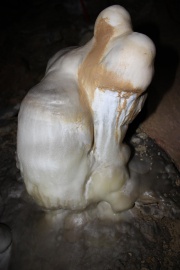Conservation (Inventory)/Restoration projects
From LagWiki
(Difference between revisions)
| Line 1: | Line 1: | ||
| - | + | [[File:Soiled stalagmite.jpg|thumb|This stalagmite has been stained with mud from being touched with soiled gloves. This is a good example of a restoration project.]] | |
| - | + | ||
| - | + | ||
The '''Restoration projects''' [[Conservation (Inventory)|conservation]] field should be used to list any stations that have human impacts which could benefit from work to restore. The human impacts could be accidental or purposeful, it doesn't matter. Muddy flowstone is one of the easiest to recognize but other useful restoration projects should be listed including broken formations and other impacts that can be restored. | The '''Restoration projects''' [[Conservation (Inventory)|conservation]] field should be used to list any stations that have human impacts which could benefit from work to restore. The human impacts could be accidental or purposeful, it doesn't matter. Muddy flowstone is one of the easiest to recognize but other useful restoration projects should be listed including broken formations and other impacts that can be restored. | ||
Revision as of 05:45, 4 May 2011
The Restoration projects conservation field should be used to list any stations that have human impacts which could benefit from work to restore. The human impacts could be accidental or purposeful, it doesn't matter. Muddy flowstone is one of the easiest to recognize but other useful restoration projects should be listed including broken formations and other impacts that can be restored.
See also

